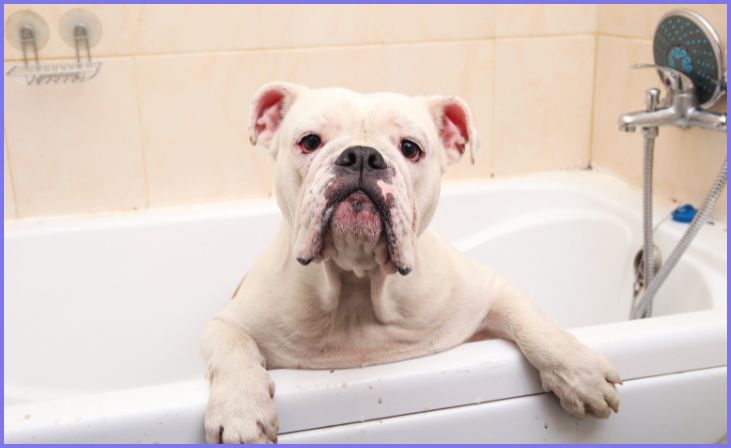Things That Annoyed A Golden Retriever – Golden Retrievers have earned a reputation for their affable and laid-back demeanor, characteristics that make them beloved companions. However, akin to any other pet, these amiable canines aren’t exempt from having their set of grievances. Recognizing and comprehending these pet peeves is not just important; it’s a pivotal aspect of ensuring optimal care and cultivating a serene and stress-free atmosphere for your furry friend.
In order to foster a harmonious relationship with your Golden Retriever, it’s imperative to delve into the nuances of their dislikes. By acknowledging and addressing these annoyances, you’re not only demonstrating your commitment to their well-being but also actively contributing to the creation of an environment that promotes happiness and contentment. After all, a stress-free Golden Retriever is not just a joyful pet; they’re a true and loyal companion, ready to share in the joys of life with you.
Loud Noises:

Golden Retrievers generally thrive in a calm and serene environment. The sudden and intense sounds of fireworks or thunderstorms can agitate them, triggering anxiety and distress. It’s crucial for pet owners to create a safe and quiet space for their Golden Retrievers during such events to help alleviate their stress.
Also Read:- Male vs. Female Rottweiler
Being Ignored:

Golden Retrievers are known for being highly social creatures, forming strong bonds with their human companions. If they feel neglected or left out, it can lead to a sense of sadness or frustration, impacting their overall well-being. Regular positive interaction, playtime, and attention are essential to fulfill their social needs and keep them emotionally content.
Lack of Exercise:

With their energetic nature, Golden Retrievers thrive on regular physical activity. Without sufficient exercise, they may become restless, bored, and may exhibit undesirable behaviors as a way to release pent-up energy. Daily walks, play sessions, and activities that stimulate both their body and mind are essential for their overall health and happiness.
Baths:

Like many dogs, Golden Retrievers may not appreciate the water or the bathing process. The sensation of water, combined with the confinement of a bath, can be uncomfortable for them, causing stress and reluctance. Positive reinforcement, patience, and gradual introduction to bathing can help make the experience more enjoyable for them.
Loneliness:

Golden Retrievers are companionship-driven dogs, and prolonged periods of solitude can lead to separation anxiety. They crave interaction and the presence of their family members. Providing them with companionship, interactive toys, and, if possible, a canine friend can help alleviate feelings of loneliness.
Unfamiliar Environments:

Golden Retrievers are creatures of habit, and sudden changes or exposure to new environments can be disconcerting. They may feel uneasy or anxious in unfamiliar surroundings, preferring the comfort of familiar places. Gradual introductions to new environments and positive reinforcement can help them adapt more comfortably.
Unpredictable Schedules:

Dogs, including Golden Retrievers, thrive on routine. Abrupt changes in feeding times or irregular walking schedules can be unsettling, as they appreciate the predictability and structure of their daily activities. Maintaining a consistent schedule helps provide a sense of security and stability for these dogs.
Tight Collars:

Due to their robust build, Golden Retrievers may find tight collars constricting and uncomfortable. It’s essential to ensure that collars are properly fitted to avoid causing discomfort or irritation. Opting for comfortable and well-fitting collars, such as harnesses, can enhance their comfort during walks.
Lack of Attention:

Golden Retrievers thrive on attention and affection. Insufficient interaction or neglect can lead to feelings of loneliness and sadness, impacting their overall happiness. Regular bonding activities, playtime, and positive reinforcement contribute to a strong and positive human-canine relationship.
Unfriendly Dogs:

Known for their friendly disposition, Golden Retrievers may feel uneasy or threatened by aggressive or unfriendly dogs. This can lead to stress and discomfort in social situations. Monitoring their interactions and providing a supportive and safe environment can help them feel secure and at ease around other dogs.
Lack of Mental Stimulation:

Intelligent and curious, Golden Retrievers require mental stimulation. A lack of engaging activities or toys can lead to boredom, potentially resulting in destructive behaviors as they seek stimulation on their own. Providing puzzle toys, training sessions, and interactive play can keep their minds active and satisfied.
Uncomfortable Weather:

Extreme temperatures, whether hot or cold, can affect Golden Retrievers’ comfort levels. They may become irritable or lethargic in response to uncomfortable weather conditions. Ensuring they have access to shade, water, and suitable shelter during extreme weather helps maintain their well-being.
Inconsistent Training:

Golden Retrievers respond well to positive reinforcement and consistency in training. Inconsistent or harsh training methods may confuse them and lead to frustration or anxiety. Clear communication, patience, and positive reinforcement contribute to effective training and a positive bond between the dog and owner.
Unpleasant Smells:

Dogs, with their keen sense of smell, may be bothered by strong or unpleasant odors. Unpleasant scents in their surroundings can be distracting and discomforting for Golden Retrievers. Maintaining a clean environment and addressing any potential sources of unpleasant odors contributes to their overall comfort.
Medical Issues:

Any pain or discomfort resulting from health issues can make Golden Retrievers less tolerant and more easily irritated. Regular veterinary check-ups are crucial for maintaining their well-being and addressing any potential health concerns promptly. Being attuned to changes in behavior or physical condition can help in early detection and intervention for any medical issues that may arise.
Also Read:- Different Types Of Mastiff Breeds
Conclusion
Gaining insight into and proactively managing the specific triggers that may irk a Golden Retriever is not merely an exercise in improving their quality of life; it also serves to fortify the special connection you have with your furry companion. By taking the time to comprehend and mitigate these potential sources of irritation, you are actively participating in the enhancement of their overall well-being.
Moreover, the benefits extend beyond the individual comfort of your Golden Retriever. Addressing these annoyances fosters a deeper and more meaningful bond between you and your canine friend. It’s a tangible expression of your dedication to their happiness and welfare. In return, a happy and content Golden Retriever transforms into a delightful and affectionate companion, enriching your life with their boundless love and loyalty. In essence, the effort invested in understanding and attending to their needs pays dividends in the form of a strong, joyous partnership that brings immeasurable joy to both you and your four-legged friend.
FAQs
Golden Retrievers have sensitive ears, making the loud sounds of thunderstorms distressing. Providing a safe and comforting space during storms can help alleviate their anxiety.
Adjust the water temperature, keep baths short, and use positive reinforcement to make bath time a positive experience.







